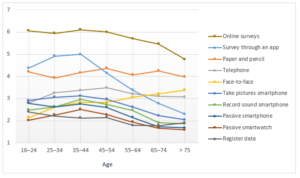How Customers Want to Be Surveyed
Let’s suppose that customers want to be surveyed. What is the best way to do it? Should we call them, send email, use text messaging, push surveys through mobile apps, or send old-fashioned paper surveys through the mail? This is a question we rarely ask in market research, because for most survey research we desperately focus on anything we can get.
Well, a research team in the Netherlands recently asked a true probability sample of Dutch citizens how they prefer participating in research. The results were interesting if only because so few of us ever ask a question like that! The research, published in Survey Practice, was conducted in 2016. The researchers were able to achieve an astonishing response rate of 73%.
Rating their willingness to participate in research and provide information through various modes of data collection, here is a look at how respondents prefer to be surveyed, by age:
 Highlights:
Highlights:
Online surveys are most preferred (but the authors note that the survey was done online, creating a “status quo bias”)
- Electronic modes of data collection (online, apps, and smart devices) are less attractive to people as they get older
- In-person surveys are less attractive to younger people
- People of all ages would rather take paper surveys than phone surveys
- People are especially wary of letting researchers append external database information (labeled in the chart as “register data”) to their survey responses
Of course the reality is that few customers want to be surveyed, with the irrefutable evidence being that most surveys nowadays achieve miserably low response rates. Why? Because so many companies abuse and badger their customers with continual streams of survey requests focused on themselves.
But there is hope! Working with a partner like Versta Research or any other serious-minded, smart, and strategic research firm, you can start to focus on your customers instead of yourself—one piece which will involve understanding how your customers want to be surveyed.
—Joe Hopper, Ph.D.
OTHER ARTICLES ON THIS TOPIC:







